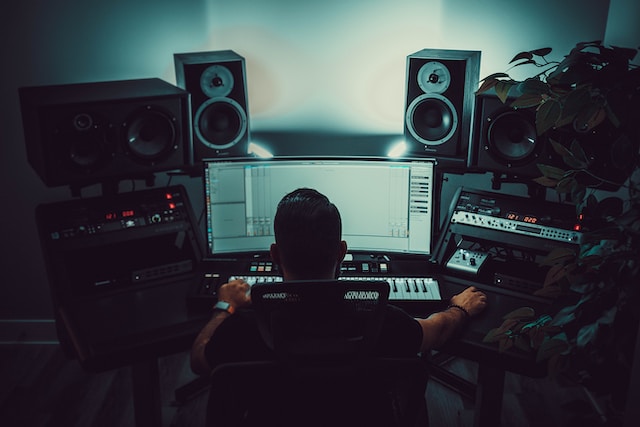Having a creative and effective recording session is something we all want to achieve, so we want to share several effective music production tips with you with proper and straightforward guidelines.
Everything works like clockwork:
One of the effective music production tips, if you want to have a professional production, is that certain things must work as a team. That’s why we love making the clock analogy. Can you imagine the complicated mechanism inside it?
Every gear has to be set to perfection, and if even one of them fails, the rest of the clock can’t keep ticking. The same thing happens with a musical production inside the home studios.
It doesn’t matter if you have a studio with state-of-the-art technology and perfect acoustics. If you’re a bad recording engineer, it’s not going to sound professional. It also doesn’t matter if you’re an excellent recording engineer but your mixes sound amateurish.
Do not work completely alone:
One thing is certain, and that is that we all have different strengths and weaknesses, so if you have someone to compliment your work, they will do something good.
This teamwork will help you to obtain very good productions and we think it is part of being humble, and accepting that we cannot be perfect on our own.
References are your best friend:
Another effective music production tip is to learn to use references in your favor. When you are recording a song, many times you may think that you want a 100% original product and you don’t want it to sound like anything else on the market.
You have to remember that it’s one thing to use a reference to get some similar sound and another thing to copy yourself from an arrangement… Which is hugely different.
In the end, they are small details that you add to your productions that “color” it, making it unique and special and, in the end, giving it your stamp.
Structure the song from the beginning:
One more effective music production tips are from pre-production… Structure the song correctly. If the song is not well structured, due to more arrangements, effects, and creative elements, the different parts of the song will not be able to be distinguished well.
It is important at the beginning of the production to talk to the artist and let them know that to obtain a professional result, the structure of the song has to be reviewed, which includes its different parts, chords, lyrics, etc.
Small sessions instead of 1 day of study:
Another important tip is to do small sessions instead of long studio sessions.
On the first of the year, he did in professional recording studios, which were rented by the day. Normally each song was recorded within 1-2 days of production. This was quite efficient, however, it has some disadvantages: Time pressure, costs, and lack of creativity.
It’s not the only way to do things either. If you do very effective pre-production, studio time (1-2 days) can be great.
Consistency and Regulatory Practice in Music Production:
In music production, consistency and regular practice are paramount. As a record producer, one of the most critical aspects to prioritize during recording is maintaining a regular practice routine.
Recording sessions can often be challenging to navigate, but by adhering to a consistent approach, you will gradually build confidence and proficiency. This consistency is key to becoming a professional in the field.
Quality experience in music production requires dedicated time investment. It’s important to identify the perfect environment that minimizes distractions and fosters productivity exclusively for your music production endeavors.
During the production process, it’s crucial to avoid distractions such as checking emails, and closing unnecessary apps and social media networks. Maintaining focus is essential, and minimizing disruptions is a strategy every producer should prioritize.
Investing in Music Production:
Embarking on a career in music production can be highly rewarding. To kickstart your journey in this field, it’s essential to be prepared to make significant investments in studio equipment, including gear upgrades, as well as allocating funds towards advertising, promotions, and acquiring additional music equipment.
Collaboration with Fellow Record Producers and Music Artists:
To maintain a leading edge in music production, engaging in collaborations with other music producers and artists can significantly enhance your production endeavors.
The benefits of such collaborations are manifold, including:
- Gaining fresh ideas and insights
- Receiving valuable advice from fellow music producers
- Learning innovative techniques
- Staying abreast of the latest trends and updates in the industry
- Enjoying flexibility and fostering a sense of enjoyment in the creative process.
Avoid Pursuing Perfection:
One of the quickest ways to stifle creativity is by striving for perfection. Rather than fixating on achieving flawlessness, allow your work to unfold naturally at its own pace.
Avoid rushing through your tasks; instead, let them progress organically through your regular process and timing. Grant yourself additional time to assess whether your work is truly complete or if it requires further refinement.
Approach your work with a sense of enjoyment and maintain a positive mindset during each music recording session. Embracing a joyful attitude can enhance your productivity and aid in accomplishing your daily tasks and objectives.
Remember not to view your work as a life-or-death matter. Embrace the flow of nature and focus on mastering the fundamentals to progress towards professionalism.
Target Audience Consideration:
It’s imperative for music producers to identify their target audience before creating records. Understanding your audience enables you to make informed decisions regarding the type of music you produce.
For instance, if you’re recording music for a church fellowship service, it’s crucial to consider the preferences of the congregation. Tailoring your music to evoke happiness and appreciation among churchgoers is essential for creating a meaningful impact with your work.
Audio Mastering:
Mastering audio is a pivotal stage in becoming a seasoned music producer. Even experienced producers often find the audio mastering process challenging. Therefore, if you’re just starting out and aiming to produce your own music, collaborating with audio engineers is essential to gain valuable experience and expertise in this crucial aspect of music production.











Leave a Reply